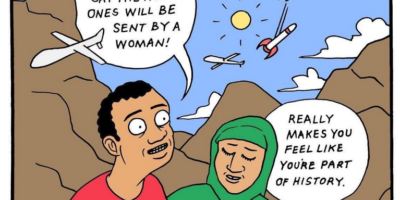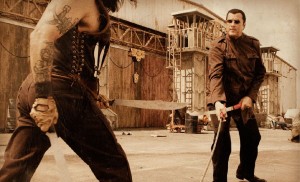The Tea Party’s worst nightmare
By Stan Heaton
At the close of a summer filled with latent Tea Party racism, right-winged fear of a white minority, and outrageously bigoted laws aimed at controlling immigration, comes Ethan Maniquis’ and Robert Rodriguez’s Machete, a film in the grindhouse fashion but with much more intellect.
The movie tells the story of Machete (Danny Trejo), an ex-Federale whose family has been murdered right in front of him by a Mexican drug lord named Torrez, played by Steven Seagal. (This is not a typo; Steven Seagal is really in this movie). Three years pass, and Machete has become a day-laborer, picking up gardening, landscaping, or septic work from whoever’s paying. When Booth (Jeff Fahey), a secretive drug smuggler, picks up Machete and asks him to kill an anti-immigration incumbent senator, McLaughlin (Robert De Niro), Machete is caught in a web of racism, revenge, and revolution.
Machete is strange to me, perhaps because of its origin. When Robert Rodriguez and Quentin Tarantino teamed up in 2007 to revive grindhouse with their movies Planet Terror and Death Proof, there were fake trailers that accompanied the two films. Machete was one of those trailers. In terms of marketing, Machete’s association with the grindhouse movies was a promise of outlandish gore, ridiculous action, and big-name actors in cheesy roles. What’s surprising about Machete is that it delivers on that promise but achieves so much more in the way of thoughtful condemnation of the current American-Mexican race relations than either Death Proof or Planet Terror did.
There’s a healthy dose of humorous violence, including a scene in which Machete uses a henchman’s intestines as a rope to escape through a window, but most of the kills are performed with garden tools, underscoring the power of working class immigrants in American society. There are several good action sequences that pit a group of American vigilante border-patrol officers (led by Don Johnson’s character, Lieutenant Stillman) against an underground Mexican army of dishwashers, mechanics, and landscapers. But the implication is that the border-patrol officers are really just terrorists; Stillman even attempts to make an execution video in the style of terrorist organizations.
The Hollywood stars also shine in Machete. Lindsey Lohan plays the self-reflexive role of April, a drugged-out internet porn star and Booth’s daughter. And Robert De Niro, in a moment of hilarity for the movie buffs out there, is forced to drive, what else, a taxi as he joins the battle against the Mexican revolution. Even these references to Lohan’s and De Niro’s star presence serve the purpose of complicating the themes of race and hatred in the movie by placing the white, American characters in positions of junkies and laborers—the exact people they despise.
Machete’s narrative operates in this racism against Mexican immigrants and the wrongfulness of it. Throughout the film, Senator McLaughlin’s campaign commercials interrupt the action to remind his constituents that Mexican immigrants are insects that comprise an alien infestation, cockroaches to be exterminated by re-electing the immigration hard-liner. As these commercials play amidst the violence of Machete’s rampage (which occasionally breaks into hilarious pornos with Machete and some number of attractive, half-naked women), we catch glimpses of working class Mexicans watching tales of Machete’s exploits on television. Though he is presented as a murderer on the loose, perhaps because of it, he becomes the hero and champion of “The Network,” an underground organization of immigrant revolutionaries led by Luz (Michelle Rodriguez).
These two images of Machete—cockroach and hero—make clear that the real battle taking place is one of perception: the racist, fear-mongering perception held by the extreme political right that views the influx of Mexicans into America as a threat to white supremacy, versus the hardworking, underprivileged perception of immigrants looking for the opportunity to expose the extreme political right exactly for what it is—a machine of power that tries to disguise racism as liberty.
Politics aside, the movie is extremely entertaining. Danny Trejo’s scarred and beaten face is captivating, and he has just enough lines for his acting ability. He is, in many ways, the perfect star for a fake B-movie because of his status as a character actor in so many other films. That’s not to say that he is a bad actor, he conveys a sense of morality well considering how many people he maims, screws, and maims with a screw. The rest of the cast, especially Steven Seagal, performs in a style that fits perfectly with this sort of movie, though De Niro’s Texas accent isn’t very convincing.
Overall, this is a good film with plenty in the way of action, humor, and thought. If you have watched or read any news this summer, then the overt political message should cleave you in the head like some sort of long, sharp knife . . . maybe a slingblade or something. With the (possibly) fake promise of Machete sequels to come, who knows how much worse race relations will get for our Mexican hero and for our country.




Leave a Reply